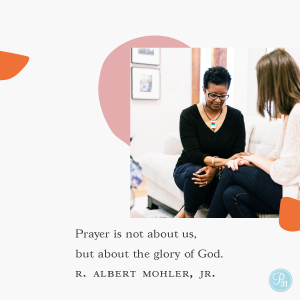
“And when you pray, do not heap up empty phrases as the Gentiles do, for they think that they will be heard for their many words.” Matthew 6:7 (ESV)

As a teenager, I realized after a few months of driving that I could often arrive at a destination and remember almost nothing about the trip there! Driving to some locations, like school, became mindlessly automatic, the entire activity performed by nothing more than instinct.
Regrettably, many of us who know Christ often do the same thing in our prayers. We can mindlessly engage in prayer — multiplying words without any real reflection or genuine affection for God.
In His teaching about prayer, Jesus was quick to point out that He didn’t want His followers to be “like the hypocrites” (Matthew 6:5) — those who just wanted to be seen by others. He also didn’t want the disciples to fall into the trap of using mindless words, as we see in today's key verse: “And when you pray, do not heap up empty phrases as the Gentiles do, for they think that they will be heard for their many words” (Matthew 6:7).
Along with affirming what prayer is — communion with God — Jesus also teaches us what prayer is not. Here’s what He’s been teaching me lately:
First, prayer is not an act of therapy.
We shouldn’t seek some sort of kickback when we pray. Some psychologists suggest people pray because prayer produces serenity and alleviates anxiety and fear. Prayer certainly does these things, but sometimes prayer actually disrupts our tranquility. God uses prayer to radically re‑orient our hearts, which can be disturbing. Prayer can sometimes be “anti‑therapy.” This is because prayer is not about us but about the glory of God.
Second, prayer is not an act of manipulation or persuasion.
We’re not just trying to find the right formula or secret code to force God to answer our prayer how we want it. Nor are we trying to persuade or bargain with God as if we weren’t one of His creations. Prayer is about God's will being done — not our own. Therefore, we come to God and learn to pray, “Your will be done,” just as Jesus did. If God’s will is truly perfect, then why would we want to persuade Him to do something that’s less than perfect? It’s true Scripture encourages us to bring our deepest concerns, anxieties and needs before God, but we must not bring our needs to God thinking it will break down a wall of hostility or complacency. We bring our needs before God humbly, willing to submit to His perfect plan.
Third, prayer is not a news report to the Creator.
God knows everything perfectly. We don't need to use prayer as a way of alerting God to what we feel He “needs” to know. Not only does God know everything — past, present and future — He knows our hearts and minds even better than we know ourselves. We pray to confess our sins, admit our dependence on Him, lay out our hearts, and pray for others. We don't pray to give God our daily briefing, but to bring all our concerns before the One who made us.
Finally, prayer is not an act of bargaining.
Maybe like me, you’ve prayed prayers that sound like you’re in a negotiation meeting: “Lord, I will work on this sin if You will help me with this blessing. Also, I’ll try to do this for You, if You promise to do that for me.” Though I wish it could, prayer doesn’t inform God of what He does not know, nor does it get Him to do what He's reluctant to do. Prayer does not change God. It changes us.
Yes, God commands us to pray, and He takes our desires in prayer seriously. Yet, God is sovereign at all times over all things … and still loving toward His people. Prayer is not our bargaining chip with a reluctant genie. It’s our opportunity to commune with the Creator and Redeemer who loves us.
Dear Lord, sometimes prayer seems difficult. Like anything of great value, it can take great effort. I pray for Your guidance and Spirit‑filled discipline to help me learn how to fall at Your feet and pray words that truly matter. In Jesus’ Name, Amen.
Luke 11:1a, “One day Jesus was praying in a certain place. When he finished, one of his disciples said to him, ‘Lord, teach us to pray …’” (NIV)
“Our Father, who art in heaven …” The opening words of the Lord’s Prayer have become so familiar, we often speak them without any awareness that we’re speaking at all. But to the disciples who first heard Jesus’ words, the prayer was a thunderbolt, a radical new way to pray that changed the course of history. To gain a deeper understanding of prayer, get your copy of The Prayer That Turns the World Upside Down by R. Albert Mohler, Jr.
If you’re looking for everyday encouragement and inspiration from a biblical perspective, follow Dr. Mohler on Twitter.
How is Jesus challenging your prayer life today, inviting you to enter into a more God-glorifying pattern of prayer?
© 2018 by R. Albert Mohler, Jr.
Proverbs 31 Ministries thanks Thomas Nelson Publishers for their sponsorship of today's devotion.
Join the Conversation